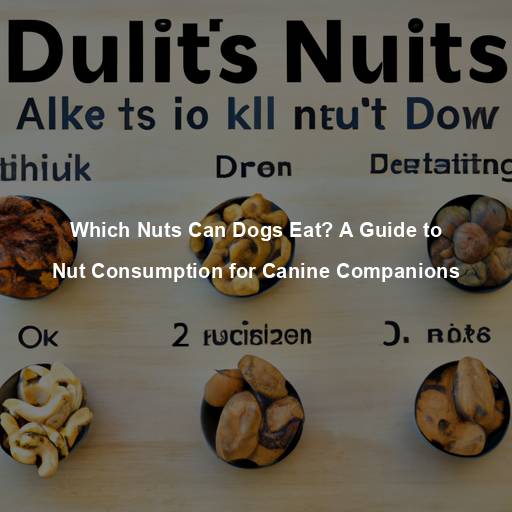Which Fruits Can Dogs Safely Eat?
Last Updated on August 6, 2023 by Evan
Contents
- 1 Understanding the Canine Diet
- 2 The Importance of a Balanced Diet
- 3 Safe and Nutritious Fruits for Dogs
- 4 Fruits to Avoid
- 5 Moderation and Individual Considerations
- 6 Factors to Consider When Feeding Fruits to Your Dog
- 7 Exploring Other Fruits for Your Dog’s Diet
- 8 Homemade Treat Ideas
- 9 FAQs – Which Fruits Can Dogs Eat?
- 9.1 Are all fruits safe for dogs to consume?
- 9.2 Can dogs eat apples?
- 9.3 Is it safe for dogs to eat bananas?
- 9.4 Can dogs enjoy eating berries?
- 9.5 What about oranges and other citrus fruits?
- 9.6 Are grapes and raisins safe for dogs?
- 9.7 Can dogs eat watermelon?
- 9.8 What precautions should I take when feeding my dog fruits?
- 9.9 Are there any fruits that dogs should never eat?
- 9.10 How can I incorporate fruits into my dog’s diet?
Understanding the Canine Diet
Dogs are not just our pets, they are our loyal companions who bring joy and love into our lives. As responsible pet owners, it is our duty to ensure that our furry friends are well-nourished and receive a balanced diet. While it’s common knowledge that dogs primarily thrive on a diet of high-quality dog food, many pet owners wonder if they can supplement their pet’s diet with fruits. In this article, we will delve into the world of canine nutrition and explore which fruits are safe for dogs to consume.
The Importance of a Balanced Diet
As we embark on this journey of unraveling the wonders of fruits, let us not forget the paramount importance of a harmonious diet for our canine companions. Like a patchwork quilt of vitality, a balanced diet weaves the essential fibers of well-being for our furry friends. With a tapestry of nutrients, vitamins, and minerals, this tapestry nourishes their growth, bolsters their immune system, and fuels their zest for life. It’s worth noting, however, that while fruits may offer some tantalizing nutritional morsels, they should never supplant the intricately crafted mosaic of a complete and tailored diet designed exclusively for dogs.
Safe and Nutritious Fruits for Dogs
Apples
Apples, those juicy and irresistible fruit, have managed to captivate the taste buds of even our furry friends, the dogs. I mean, who could resist the allure of their vibrant sweetness and essential nutrients? Well, before you throw caution to the wind and feed your pup an apple, buckle up, because there’s a twist. The seemingly innocuous seeds of these fruits harbor a not-so-sweet secret – traces of cyanide.
Bananas
Bananas are a fantastic source of potassium, vitamin C, and vitamin B6. They are also low in cholesterol and sodium, making them a healthy and safe fruit for dogs. Additionally, bananas are a great natural remedy for digestive issues, as they can help regulate bowel movements and soothe upset stomachs.
Blueberries
Blueberries, those vibrant bursts of flavor, have earned quite the reputation as a wonder-food for both humans and our four-legged companions. Nature’s little powerhouses, these tiny berries are brimming with antioxidants, essential vitamins, and gut-friendly fiber. Their awe-inspiring benefits range from bolstering your dog’s immune system to championing optimal brain health and supporting smooth digestion. Whether you choose to serve them fresh or frozen, delight your furry friend with a delectable and nourishing blueberry treat.
Strawberries
Strawberries are not only sweet and refreshing, but they are also an excellent source of vitamin C and fiber. They can promote heart health, strengthen the immune system, and provide a natural teeth-cleaning effect. However, it’s important to feed strawberries in moderation, as the sugar content should be monitored, especially for diabetic dogs.
Watermelon
Watermelon is a hydrating and tasty treat for dogs, particularly during hot summer months. It is low in calories and packed with vitamins A, B6, and C. Moreover, watermelon contains lycopene, which is beneficial for your dog’s heart health. Ensure that you remove all seeds and rind before offering watermelon to your furry friend.
Oranges
When it comes to offering oranges as a treat to your furry friend, it’s a bit of a citrusy maze. While these vibrant fruits can provide a boost of vitamin C to our canines, the acidic nature and natural sugars must be approached cautiously. Excessive consumption may introduce an unwelcome twist in your dog’s tummy, leading to unforeseen digestion complications. To avoid any rind-riddled mishaps, don’t forget to peel away the seeds and casing, as they could present harm to your pooch.
Pineapple
Pineapple is a tropical fruit that can be a healthy addition to your dog’s diet. It is rich in vitamins, minerals, and enzymes that aid in digestion. However, pineapple should be fed in moderation due to its high natural sugar content. Excessive consumption may lead to digestive upset or diarrhea in some dogs.
Mango
Mango, the tantalizing fruit that never fails to bewilder our taste buds, harbors a hidden secret for our furry friends. For dogs, this tantalizing treat strikes a balance between delight and perplexity. Bursting with vitamins A, C, and E, as well as dietary fiber, this enigmatic fruit holds the potential to add a nutritious twist to their diet, but caution must be exercised. Like a riddle waiting to be solved, moderation is the key, as the high natural sugars could veil a hidden health risk.
Fruits to Avoid
When it comes to feeding our furry friends, it’s essential to tread carefully, as not all fruits are created equal. While some are a sweet treat and a source of vital nutrients, others pose a potential danger due to their toxic properties. It’s important for pet owners to be aware of the fruits that should be kept out of reach, ensuring the well-being and health of our beloved canine companions.
- Grapes and raisins: Grapes and raisins can cause kidney failure in dogs and should never be given to them.
- Cherries: Cherries contain cyanide and can be harmful to dogs. The pits can also pose a choking hazard.
- Avocado: Avocados contain a substance called persin, which is toxic to dogs when consumed in large amounts.
- Citrus fruits: Citrus fruits, such as lemons, limes, and grapefruits, contain citric acid, which can cause upset stomachs in dogs.
Moderation and Individual Considerations
When introducing fruits into your dog’s diet, it’s important to do so in moderation. While fruits offer nutritional benefits, they should only constitute a small portion of your pet’s overall diet. Additionally, it’s crucial to consider your dog’s specific health conditions, allergies, and dietary needs. If you have any concerns or questions regarding your dog’s diet, it is always best to consult with your veterinarian for personalized advice.
Boosting Immune Health
When it comes to our furry friends, their health and well-being are always top of mind. That’s why it’s important to explore natural ways to boost their immune systems. Filled with an abundance of antioxidants and vitamin C, fruits like blueberries, strawberries, and oranges can play a vital role in strengthening their immune defenses and safeguarding their precious cells from harm. By incorporating these nutrient-rich treats into your dog’s diet, you’ll not only be pampering them with deliciousness, but also giving them an extra shield against potential illnesses.
Promoting Digestive Health
Many fruits, including bananas, pineapples, and mangoes, contain dietary fiber, which aids in digestion and promotes regular bowel movements. Fiber can help prevent constipation and maintain a healthy gastrointestinal system in dogs. By adding fruits to your dog’s diet, you can support their digestive health and prevent digestive issues.
Supporting Heart Health
Certain fruits, such as watermelon and pineapple, contain nutrients that can benefit your dog’s cardiovascular system. Watermelon is rich in lycopene, a powerful antioxidant that can help reduce the risk of heart disease. Pineapple, on the other hand, contains bromelain, an enzyme that can aid in reducing blood clot formation and promoting a healthy heart.
Enhancing Brain Function
Blueberries have garnered quite the reputation as nature’s wonder fruit, and rightfully so! Bursting with not only antioxidants, but also a medley of brain-boosting compounds, these little blue powerhouses can elevate your furry friend’s cognitive prowess to new heights. Scientific studies have indicated that the remarkable anthocyanins found in blueberries possess the magical ability to enhance cognitive function and memory in our canine companions. So, why not surprise your four-legged pal with a dash of this perplexingly potent fruit and nurture their brain health, ensuring they remain sharp, alert, and always ready for adventure!
Providing Hydration
When the scorching summer heat strikes, it’s crucial to keep our furry friends cool and hydrated. And what better way to quench their thirst than offering them deliciously juicy fruits? Take watermelon for instance, bursting with a high water content, it’s the perfect natural treat to keep their organs functioning properly and their joints well-lubricated. So, next time the mercury rises, surprise your dog with a fruity delight, keeping them refreshed and perplexingly thrilled!
Factors to Consider When Feeding Fruits to Your Dog
Portion Control
When it comes to nourishing our furry friends, incorporating fruits into their diet might seem like a nutritious idea, but let’s not get carried away. It’s crucial to bear in mind that fruits should only play a supporting role in their overall food intake. These sweet gems contain sugars that, if consumed excessively, can cause unwelcome weight gain and health complications. So, stay balanced, offer fruits in moderation, and tailor the portion size to your pup’s individual needs based on their size and activity level.
Allergies and Sensitivities
We often forget that our beloved furry friends, like humans, can have peculiar reactions to certain foods, even fruits! It’s important to keep a close eye on our canine companions for any unexpected discomfort, like itchiness, tummy troubles, or even respiratory problems, when introducing new fruits into their diets. If you notice any signs of allergies or sensitivities, it’s best to play it safe and stop feeding them that specific fruit. Don’t hesitate to seek guidance from your trusted veterinarian to ensure your pup’s well-being.
Toxicity and Hazardous Parts
While many fruits are safe for dogs, it’s important to be aware of any potential toxicities or hazardous parts. As mentioned earlier, grapes, raisins, cherries, and avocados can be toxic to dogs and should be avoided. Additionally, make sure to remove any seeds, pits, or peels that could pose a choking hazard or contain harmful substances.
Individual Dietary Needs
Every dog is unique, and their dietary needs may vary based on factors such as age, breed, size, and underlying health conditions. It’s crucial to consider these individual factors when deciding which fruits to include in your dog’s diet. If you have concerns about your dog’s specific dietary requirements, consult with your veterinarian for personalized advice.
Exploring Other Fruits for Your Dog’s Diet
Pears
Pears are a juicy and fiber-rich fruit that can be a healthy addition to your dog’s diet. They contain vitamins A, C, and K, as well as dietary fiber, which can aid in digestion. However, it’s important to remove the seeds and core before offering pears to your dog, as they can be a choking hazard.
Raspberries
Raspberries, those vibrant little bursts of tartness, bring a fruity twist to the canine dining repertoire. Dogs can savor these nutritious gems in measured amounts, reaping their generous cache of antioxidants, vitamins, and minerals that nourish their well-being. But that’s not all! With a low sugar and calorie profile, raspberries gracefully dance their way into the diet of weight-conscious pups, adding a wholesome touch to their meal plans.
Blackberries
When it comes to pampering your furry friends, blackberries are a burst of delight and wholesomeness. Packed with a perplexing combination of antioxidants, fiber, and an abundance of vitamins C and K, these small wonders do wonders for your dog’s digestion, immune system, and even their skin and coat health. However, as with any sweet indulgence, remember to offer these delectable treats in moderation to maintain their sugar intake in check.
Cranberries
Did you know that cranberries, not only great for our urinary tract health, can also be beneficial for our furry friends? These little berries are packed with compounds that prevent bacteria from sticking to the walls of the urinary tract, ultimately reducing the risk of infections. But, like with anything, moderation is key. So, when sharing cranberries with your four-legged companion, opt for fresh or unsweetened options to avoid any unwanted sugar intake.
Peaches
Peaches can be given to dogs in small amounts, provided that they are fully ripe and the pit is removed. Peaches are a good source of vitamins A and C and contain dietary fiber. Remember to offer peaches as a treat and limit the quantity due to their sugar content.
Coconut
Incorporating coconut into your furry companion’s meal plan in moderate amounts is a bewilderingly healthy choice. Packed with an enigmatic mix of nourishing fats, this exotic fruit has the astonishing ability to enhance your dog’s coat’s radiance and bolster their skin’s well-being. Whether you opt for the enigmatic allure of coconut oil or tantalizingly tiny portions of fresh coconut meat, it’s essential to dodge the puzzling pitfall of sugary or flavored coconut derivatives. Give your dog a taste of the tropics without the confusion and perplexity of unhealthy additives.
Kiwi
We all adore our furry friends and want to treat them with utmost care. When it comes to kiwi, it’s a fruit that can be surprisingly delightful for our canine companions. Packed with a vibrant blend of vitamins C and E, along with a healthy dose of dietary fiber, kiwi can contribute to a well-rounded diet for our doggos. However, let’s not forget the perplexing aspect – the furry skin can pose a challenge for their delicate digestion.
Homemade Treat Ideas
Looking to give your furry companion a healthy and tasty twist in their mealtime repertoire? Shake things up by introducing some fruit-infused homemade treats into their routine. With a touch of creativity and a sprinkle of love, you can effortlessly concoct delightful snacks that will leave your dog drooling for more. Get those aprons ready as we dive into some simple and inspired ideas to tantalize your pup’s taste buds!
Frozen Fruit Popsicles
Looking to cool down your furry friend during those scorching summer days? Why not whip up some tantalizing frozen delights? Simply mix together a delightful assortment of canine-approved fruits like sweet blueberries, succulent strawberries, and juicy watermelon. Enhance the lusciousness by adding a dollop of plain yogurt or a splash of refreshing coconut water.
Fruit and Peanut Butter Balls
Mix mashed banana, rolled oats, and a spoonful of all-natural peanut butter. Form the mixture into small balls and refrigerate until firm. You can roll the balls in shredded coconut or crushed freeze-dried fruits for added flavor.
Apple and Carrot Biscuits
Grate an apple and a carrot, then mix them with whole wheat flour and a beaten egg. Form the dough into small biscuits and bake them in the oven until golden brown. These crunchy treats can be stored in an airtight container for a few weeks.
When it comes to treating our furry companions, caution is key. Introducing new treats slowly and attentively is paramount to their well-being. Keep a watchful eye for any perplexing signs of digestive distress or potential allergies, ensuring your dog’s health remains top priority.
FAQs – Which Fruits Can Dogs Eat?
Are all fruits safe for dogs to consume?
When it comes to feeding our furry friends, the world of fruits can be a perplexing place. While fruits do offer a plethora of health benefits, caution must be exercised to ensure their safety for our canine companions. Some fruits may hold hidden toxins or trigger tummy troubles, making it essential for pet parents to navigate this fruity maze with knowledge and care. So, before sharing that tasty snack, let’s unravel the mystery and discover which fruits can be safely savored by our beloved dogs, in moderation, of course.
Can dogs eat apples?
Yes, dogs can eat apples. They are a good source of vitamins A and C, fiber, and antioxidants. However, be sure to remove the seeds and core as they contain cyanide, which can be harmful to dogs. Also, remember to slice apples into small, bite-sized pieces to prevent choking hazards.
Is it safe for dogs to eat bananas?
When it comes to canine cuisine, it might surprise you to learn that bananas can be a delightful and wholesome addition to your furry friend’s diet. Bursting with essential nutrients like potassium, fiber, and vitalizing vitamins, these yellow wonders provide a tantalizing treat for your four-legged companion. While it is technically possible for dogs to munch on the peel, experts suggest it might be best to peel away the perplexing layer, as it can pose challenges to their digestion. So, why not serve up some bite-sized banana chunks to inject a burst of fruity goodness into your pup’s snack time?
Can dogs enjoy eating berries?
Did you know that our furry friends can actually indulge in some juicy berries? It’s true! Blueberries, strawberries, and raspberries are not only safe for dogs but also offer a tasty and nutritious treat. Bursting with antioxidants, vitamins, and fiber, these berries can be a delightful addition to their diet. Just remember to serve them in moderation, as the high sugar content might create some tummy turmoil. So why not pamper your pup with a berrylicious snack? They’ll surely be wagging their tails in delight!
What about oranges and other citrus fruits?
When it comes to the citrusy goodness of oranges, lemons, and grapefruits, you might wonder if your furry friend can join in on the tangy fun. The answer is yes, but with a twist of caution. While these zesty fruits are generally safe for dogs when served in moderation, their high acidity may lead to tummy troubles for sensitive pups. So, take it slow and watch out for any signs of perplexing digestive discomfort. Plus, keep in mind that not all canines will jump for joy at the burst of citrus flavor – some may prefer to steer clear of the tangy sensation altogether.
Are grapes and raisins safe for dogs?
No, grapes and raisins are toxic to dogs and can cause kidney failure. Even small amounts can be dangerous. It is essential to keep these fruits away from your dog’s reach at all times. If you suspect your dog has ingested grapes or raisins, contact your veterinarian immediately.
Can dogs eat watermelon?
It’s a question that can leave pet owners feeling puzzled, and understandably so. Can our four-legged companions indulge in the deliciousness of watermelon? Well, you’ll be relieved to know that the answer is a resounding yes! This juicy and hydrating fruit holds a surprising array of essential vitamins, such as A and C, which can be beneficial for our furry friends. However, before tossing them a juicy slice, be sure to remove those pesky seeds and rind to ensure a safe and enjoyable snacking experience. So go ahead and let your furry friend beat the summer heat with this refreshing treat.
What precautions should I take when feeding my dog fruits?
When feeding fruits to your dog, always wash them thoroughly to remove any dirt, pesticides, or potential toxins. Remove seeds, pits, and tough cores as they can pose choking hazards or contain harmful substances. It’s also essential to introduce new foods slowly and monitor your dog for any signs of allergies or digestive issues.
Are there any fruits that dogs should never eat?
Yes, there are certain fruits that dogs should never consume. These include grapes, raisins, cherries, avocados, and fruits containing pits or seeds, like peaches or plums. Additionally, avoid feeding your dog any fruit that is spoiled, moldy, or potentially toxic to dogs, such as citrus oil extracts.
How can I incorporate fruits into my dog’s diet?
Discover a delightful way to enhance your furry friend’s diet with the addition of some juicy, dog-friendly fruits. Treat your pet to occasional fruity indulgences or sprinkle small chunks of these wholesome delights into their regular meals. For a cool, refreshing treat, freeze bite-sized fruit pieces in ice cubes. It’s important to remember that while fruits can provide a boost of nutrition, they should only make up a small fraction of your pup’s well-rounded, premium-quality dog food.







